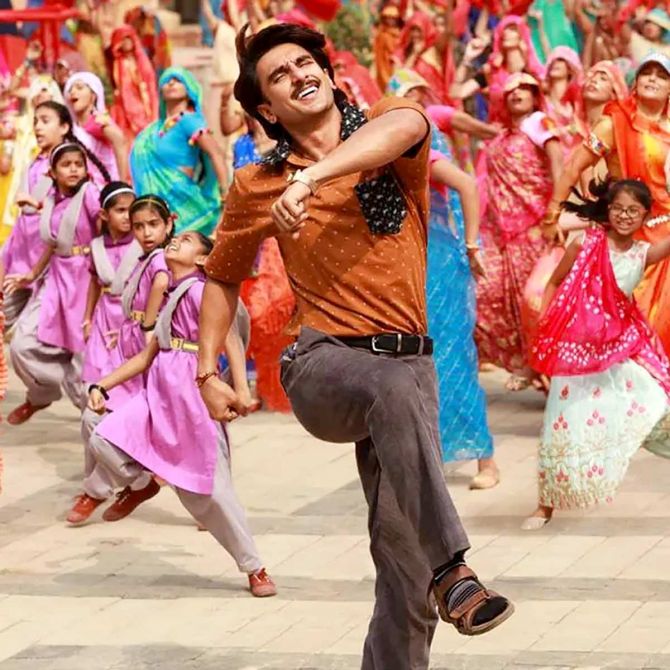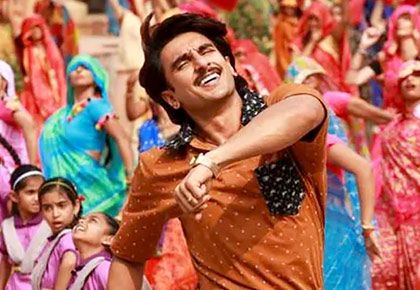Essentially a message movie, Jayeshbhai Jordaar masks its horror in humour to play out like an on-the-run road trip, observes Sukanya Verma.

Jayeshbhai Jordaar is no satire but uses humour as a device to condemn the evils in society.
Focusing on the issue of female foeticide and the deeply-entrenched misogyny that perpetuates it, Divyang Thakkar's dramedy dryly notes an obsession with extending the bloodline across a conservative, patriarchal Gujarati community.
Sex determination is a punishable offence cry the walls of a clinic, but it's a common practice in the village of Pravingarh, where godly phrases decide if the verdict is thumbs up or down.
'Jai Shree Krishna' spells lottery.
'Jai Mataji' spells doom.
And when medical science fails, all hope is pinned on the actions of head bobbing goats or ladoo-dropping babas.
Jayeshbhai's wife Mudra (Shalini Pandey) is pregnant for the eighth time and his parents (Boman Irani, Ratna Pathak Shah) are hellbent on a boy.
It doesn't matter their daughter-in-law has undergone six miscarriages and every new pregnancy endangers her health.
It doesn't matter they already have a super sharp and social media savvy granddaughter in Siddhi (Jia Vaidya).
The only thing that matters is her new-born must be a son who carries their vansh forward.
From science to superstitions, her in-laws leave no stone unturned in ascertaining if the baby belongs to the desired sex.
Just how cowardly Jayeshbhai (Ranveer Singh) behaved until this point, the movie doesn't elaborate.
A hero's sins cannot be as noticeable as his redemption -- this is after all his journey from Jayeshbhai to Jordaar, enabler to empowerment.
And so we come into the story only after he learns the latest is also a girl and resolves to save the unborn infant from his ruthless family at any cost.
An all-men's village, an inevitable fate for all if the skewed sex ratio isn't amended, in Haryana volunteers to help.
Except Jayeshbhai's plan to run off with the expectant wife and pre-teen daughter turns into a classic case of out of the frying pan and into the fire.
Essentially a message movie, Jayeshbhai Jordaar masks its horror in humour to play out like an on-the-run road trip, soaking in the quaintness and quirks, signs and stereotypes of the region.
What's genuinely Gujarati though is how the runaways regularly find pit stops that keep them well fed and fuelled.
A series of outwitting schemes and enroute confrontations between masculinity at its stubbornest and positive follow.
Amidst a fluctuating mood and tonal shifts, Thakkar lightens up a serious situation in a manner that's both ironic and telling.
Be it the perfunctory women's quota, tools of control becoming hurdles in the path when pictures of a ghoongat-clad bahu are no good on promises of a prize or saviours from Haryana ogling at the very women they've arrived to aid.
The premise grows increasingly over the top, but the movie's confidence is unwavering. Especially in the climax, when the 'jor' in the title is shrewdly played on to assert when push comes to shove.
But the revolution it inspires is hard to buy into.
Jayeshbhai Jordaar believes the world can be saved with a 'pappi.'
One soppy speech on the transformative power of kiss from Jayeshbhai and the women change from apologetic figures to face of rebellion.
Ratna Pathak Shah has an authoritative presence, but it's too underwritten a part to be moved by for its cursorily hinted complexity.
She may at the centre of action, but Shalini Pandey piggy backs entirely on Ranveer Singh's feminism to leave any impact.
It's the precocious spunk packed in by Jia Vaidya as her daughter and Deeskha Joshi as the sister-in-law that Jayeshbhai Jordaar benefits from.
As for the men, Boman Irani is a veteran at playing killjoy.
His traits here reminded me a bit of Alfred Molina's village mayor and his aversion for the attractive things of life in Chocolat.
While the latter demands abstinence from chocolate, Irani bans soap from women's lives attributing its fragrance as the root cause of eve teasing.
Ranveer Singh is reliably wholehearted in bringing out the diminutive, pushover presence of Jayeshbhai, his accent and his gradual triumph.
What he completely sidesteps is the grey zone or the remnants of its lingering guilt that prompt his course correction.
Writer-director Divyang Thakkar is big on social conditioning.
All the characters in his story are absolved of their complicity simply because he reasons they were raised like that.
Ultimately, instead of holding them accountable, Jayeshbhai justifies, 'it's not their fault.'
But it is.
Change of heart doesn't happen in a flash.
Conditioning doesn't overwrite itself overnight.
Jayeshbhai Jordaar's eagerness for right thinking refuses to see the difference between is and ought.

- MOVIE REVIEWS

